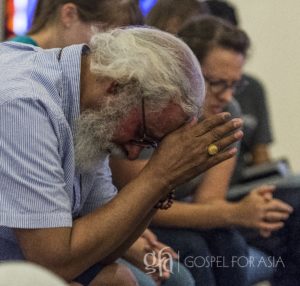 Naaman was raging with anger. He had traveled all the way from Syria with chariots full of gold, silver and expensive gifts for Elisha—and now the prophet wouldn’t even grant him a one-minute audience. And what was worse, Elisha’s servant passed a message to him that he should dip seven times in the Jordan River to be healed of his leprosy (see 2 Kings 5:9–12).
Naaman was raging with anger. He had traveled all the way from Syria with chariots full of gold, silver and expensive gifts for Elisha—and now the prophet wouldn’t even grant him a one-minute audience. And what was worse, Elisha’s servant passed a message to him that he should dip seven times in the Jordan River to be healed of his leprosy (see 2 Kings 5:9–12).
It was a simple, inexpensive ritual he was supposed to perform. No one could make fun of him because he was far away from his homeland.
But the mighty captain of the Syrian army was not about to follow these stupid instructions. Why? These instructions were not his own thoughts.
In his fury, Naaman exclaimed, “Behold, I thought, He will surely come out to me, and stand, and call on the name of the Lord his God, and strike his hand over the place, and recover the leper” (2 Kings 5:11, kjv).
However, the servants of Naaman realized that their master was about to pass up his only possible chance to get healed. Fearing they had made the long trip with all its hardship and headache for nothing, they pleaded with him. Naaman finally calmed down, obeyed the prophet’s instructions and experienced the healing power of the God of Israel (see 2 Kings 5:13).
Here’s the frightening truth: Naaman came as a leper and was about to go back as a leper, to live a lonely, rejected, depressed and forsaken life. In the end he would have died of his disease, all because he thought the wrong thoughts.
This can be our experience as well!
Our own thoughts are one of the greatest enemies of a life of faith that honors God.
We may pray, fast, agonize, weep and cry out to God about a matter, but we receive no answer. Why? Like Naaman, we cling to our own thoughts as to how God should go about answering our request. And with our boundaries, we tie the hands of God and prevent Him from moving on our behalf.



 If there is no greater glory than being a servant of all, then much of our 21st-century Church is miles away from the pattern Christ left us. Our worldly view of glory is precisely where we need to get our understanding set straight.
If there is no greater glory than being a servant of all, then much of our 21st-century Church is miles away from the pattern Christ left us. Our worldly view of glory is precisely where we need to get our understanding set straight.




